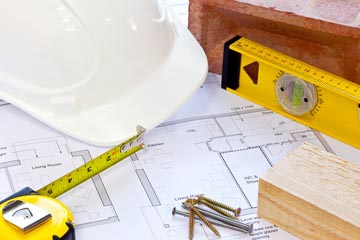 Hi folks,
Hi folks,
Here is an important issue that I think it is worth covering for any building works that you may have planned for the future. The answer is yes it is advisable to retain an Architect, Structural Engineer or Building Surveyor to inspect periodically during building or renovation works and to advise you and certify the works on completion. Your Certifier should have full Professional Indemnity insurance and be sure to request a copy of the insurance and retain it for future reference. An average house requires 5 stage payments but the more visits the certifier makes the better. The Certifier must feel satisfied that the works comply with the building regulations and therefore it takes as many visits as it requires. Don’t forget that the building regulations are there to protect you or future owners of the building so it’s no advantage to take short cuts on the specifications that are laid down. In fact I would say aim to go beyond what the regulations specify as much as possible because you only have one chance to get the job done right. It is particularly important for example that the required depth of foundation is dug with the required re-enforced steel. This should be inspected by the certifier before the concrete is poured.
I know it sounds over the top but I would advise you to be present during the pouring of the foundation so that you can see the cement being poured over the re-enforced steel and take photos while the concrete is being poured and keep them as a record. The same applies for the sub floor, make sure it is inspected by the certifier to ensure that the correct depth of concrete is being laid and that the correct amount of re-enforced steel has been included in it.
It is the law in Ireland that your building must be compliant with building regulations. These regulations are there to protect you from having a property that is structurally unsafe or that could be a fire hazard. Using a certifier to inspect and sign off on your building is not only the law but it could also an insurance policy for you in the event that your property was ever deemed to be non-compliant in the future. If it is found at a later stage that your property was non-compliant at the time it was certified, the certifier’s professional indemnity insurance could possibly cover you for any losses
Make sure that the certifier is completely separate from the building contractor. It is not a good idea to have someone who is related in any way to the builder as there could be a conflict of interest. So for complete peace of mind please use an independent certifier.
As with any profession I would say keep a good eye on what is going on yourself. Don’t take it for granted that the certifier will see everything so make sure to inspect the building daily and take lots of photos that you can refer back to or show to the certifier or any interested parties. Familiarise yourself with the regulations so that you can even spot some obvious stuff yourself. You can find technical guidance documents from the Irish Department of the Environment, Heritage and Local Government Resources at http://www.environ.ie/en/TGD. This will be one of the biggest investments of your life and it’s your money so make sure that you keep a good eye on everything and don’t be afraid to ask the certifier if you’re unsure about something the builder is doing. And if you’re not happy with the answer the certifier gives you ask someone else.
As the building owner, you are responsible for compliance with the Building Regulations. As I said above these regulations are the law, so it is illegal to be non-compliant. Non compliance can result in a fine or prison sentence or in the case where non compliance causes the death of someone could result in a charge for manslaughter. Where buildings are found to be non-compliant you will be forced to remedy the faults or even to tear down the building altogether in the case of a severe problem.
You can’t sell a property without an opinion on compliance with the Building Regulations so whether you are building a new property or extending or renovating a property make sure to have it certified.
And lastly please do not pay for work until it has been signed off by the certifier up to that stage. If the builder wants you to pay for work in advance it is better to pay the money into an escrow account. An escrow is a holding account where money is held by a trusted third party and it can be released in stages as the work has been certified or approved by you. The escrow protects you as you only release the money as the work has been approved and the escrow protects the builder as they know that the money is there for them when the work has been signed off. A solicitor can hold money in escrow or you can use a trusted online escrow service. We provide a link to an escrow service to all users who post a job on our website and we highly recommend that it be used.
I cannot emphasise enough the importance of getting your building works properly certified throughout the building works and if you think you are going to forget the advice I have given you in this article please print or bookmark this page and read it over and over again throughout your building project until it is complete and certified:-)
To find an Architect, Structural Engineer or Building Surveyor go to the Golden pages or get up to 4 quotes from any of these professional here
Cheers
Oliver Dempsey
Tradesmen.ie
The advice in this article is meant as a guide only and a decision should only be made on how to proceed with your building project by consulting with a qualified building professional who can inspect your particular project and give appropriate advice on the matter.
Please feel free to comment below if you have any questions or suggestions
Here are some other articles that you might be interested in below:-
http://blog.tradesmen.ie/2011/10/attic-conversion-prices-dublin-ireland
http://blog.tradesmen.ie/2012/04/house-extension-prices-dublin-ireland
http://blog.tradesmen.ie/2012/04/do-i-need-planning-permission







Pingback: Attic Conversion Prices Dublin Ireland | Tradesmen.ie Blog